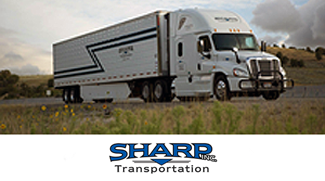FSMA: From One Fleet to Another

Coming into compliance with new regulations can throw industries into chaos as they rework procedures, policies, and the documentation of those processes. With significant changes aimed at the food transportation industry, the Food Safety Modernization Act of 2011 — the most sweeping reform of America’s food safety laws in more than 70 years — has the potential to do just that.
It’s now been a year since the FDA issued the FSMA final rules concerning the sanitary transportation of human and animal food, meaning most shippers and carriers must take immediate action to come into compliance with the new rules.
Of course, taking a more proactive approach to understanding these new regulations and revising your policies now can save you from big headaches further down the road. To comply with the new rules, you may need to evaluate your procedures, especially concerning temperature-sensitive foods.
Kevin Boydstun of Sharp Transportation says you should pay special attention to the need to thoroughly clean trucks, especially when switching between different materials. If a truck makes a nighttime delivery, your planner will need to factor time into the next day’s schedule to allow for cleaning before reloading the truck with different products. There are many nuances of cleaning that inexperienced drivers need to learn, such as keeping an emptied truck that had carried frozen chickens cool all night, so that any blood or other animal parts don’t melt and create a bigger mess. And before your drivers receive a new load of frozen products, they need to make sure their truck is at the correct temperature.
“Dispatch, we want them to communicate with the drivers,” Boydstun said. “Again, make sure they’re getting pre-cooled, make sure they understand what they’re loading and how it’s to be loaded.”
Your drivers also need to play an active role in monitoring the temperature of materials during transit, and systems need to be in place to allow them to communicate those temperatures to customers. Under the new rules, your customers will want to know much more detail about the transportation of temperature-sensitive products. Customers receiving products may reject a product if you can’t prove that the temperature held steady during the trip and did not compromise the safety of the product.
To avoid assuming the liability for making a product unsafe, drivers must also take the time to inspect products on the dock before they’re loaded onto their trucks, Boydstun said. For products that need to remain frozen at all times, there are signs that indicate that products were not properly stored prior to loading.
“If a pallet comes out of a freezer dock onto a warm dock, you’ll get the condensation in the plastic and you can kind of see it’s been sitting there for a while,” Boydstun said. “Also, if you’ve got heavy ice buildup on there, that could be a telltale sign that it sat on a warm dock prior to going into the freezer, so you just want to be aware of that.”
Adapted from a white paper sponsored by Spireon. For more FSMA tips, get the full white paper.
Spireon, Inc. is the industry’s leading open connected vehicle company, providing businesses and consumers with powerful Big Data insights to track, manage and protect their most valuable assets. The award-winning Spireon NSpire open platform delivers rich information from any connected vehicle or asset, converting Big Data into actionable insight. Headquartered in Irvine, CA, Spireon’s open connected vehicle platform supports over 3.85 million active subscribers across the company’s growing suite of product offerings. Visit www.spireon.com/trailer-management to learn more.


